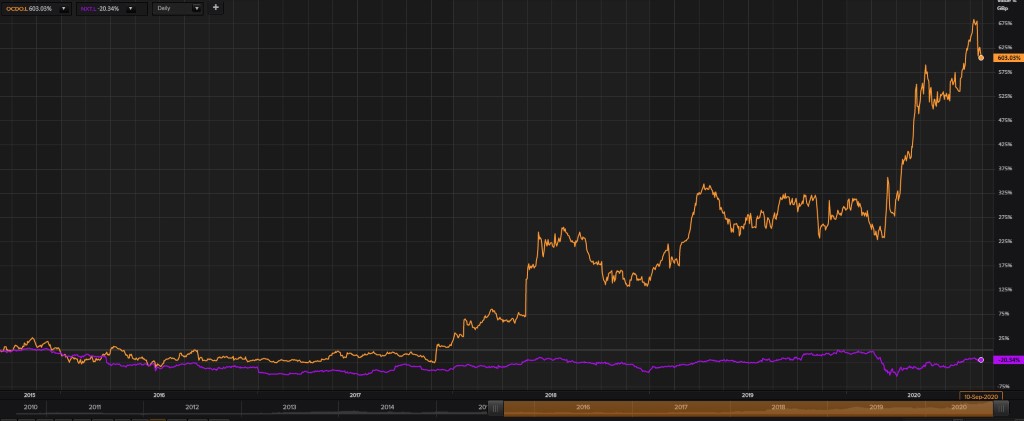Why do investors continue to pay such a premium for growth? Let’s take two FTSE 100 retailers – Ocado and Next, both of which report their latest trading numbers next week. Ocado delivers Q3 numbers on September 15th, with Next following with its half-year results on September 17th. The two companies offer rather different entry points into the UK retail space. Ocado carries tech-level valuations, and has been touted as the Microsoft of retail, whilst Next is relatively unloved despite its very respectable omnichannel mix and successful switch to online that has not been mirrored by all its peers. The respective CEOs – Lord Wolfson at Next and Ocado’s Tim Steiner are also rather different characters.
Ocado (LON: OCDO) shareholders will be keen to hear how management think the Marks & Spencer tie-up has gone so far. Investors will also want the answer to the perennial question – where is the cash? It likes to raise fresh funds to pay for its global expansion – raising another £1bn in debt and equity in June this year – but is less keen on actually generating it.
Ocado’s share price has rocketed this year thanks to the boom in online retail. Its +77% rally in 2020 puts it behind only Fresnillo in terms of YTD gains on the blue-chip index. However, it’s yet to really deliver any returns to investors by way of free cash.
Earnings from international partners remain slow to emerge and in July management cautioned that EBITDA from International Solutions would decline due to ‘continued investment in improving the platform and building the business, and from increased support costs with launch of initial CFC sites’.
Booming retail sales in the UK (+27% H1) are priced in, as are sustainable fees from international partners. The latter carries considerable execution risk.
Meanwhile, retail bellwether Next (LON: NXT) (-16% YTD) is a cash cow that even with a collapse in the high street consistently manages to deliver free cash flow. The pandemic has proved more challenging – suspending buybacks and dividends, and selling off assets have been required to shore up the balance sheet this year. But it remains a resilient company able to generate pre-tax profit. Its half year results follow on Thursday.
In July the company reported that while full price sales in the second quarter were down -28% against last year, this was far better than expected and an improvement on the best-case scenario given in the April trading statement. Management guided full year profit before tax at £195m based on its central scenario.
If we know anything about Simon Wolfson, it’s that he likes to under promise and over deliver – albeit there are risks, as Dunelm stressed today, that a second lockdown could damage demand going into Christmas. In the more optimistic scenario laid out in July, pre-tax profits would be £330m – we are yet to see if high street footfall has made a genuine difference.
After peaking in February at £1.15bn, under the central scenario Next expects net debt to close the year at £648m, which would be a reduction of £464m in the year.
Despite generating cash every year, Next’s share price has lagged Ocado’s significantly over the last 5 years.

And taking this simple peer analysis, on both return on equity and price to cash flow metrics, Ocado looks very richly valued.

(charts and data from Markets.com, Reuters Eikon)
Risk Warning: this article represents only the author’s views and is for reference only. It does not constitute investment advice or financial guidance, nor does it represent the stance of the Markets.com platform.When considering shares, indices, forex (foreign exchange) and commodities for trading and price predictions, remember that trading CFDs involves a significant degree of risk and could result in capital loss.Past performance is not indicative of any future results. This information is provided for informative purposes only and should not be construed to be investment advice. Trading cryptocurrency CFDs and spread bets is restricted for all UK retail clients.